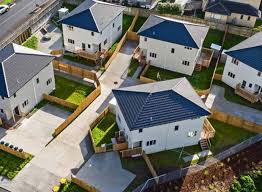In my previous article, titled “Simon Bridges and the Wokester Police Commissioner – why he got this wrong”, I outlined the problems that I had with removing a gang from my quiet suburban street. That article focussed on the police action and why Mr Bridges got it wrong calling the police commissioner a “wokester”. The real problem was with Kainga Ora and their response to the situation.
In this article, I will outline the problems we had in dealing with Kainga Ora and why I believe you should be alarmed. Kainga Ora has recently spent $750 million on social housing and one of their houses is coming to your street soon.
Dealing with government departments is often not easy, but when government policy actually infringes on your human rights, civil liberties and privacy, at the expense of gangs, then you should rightly be very concerned.
As I outlined in last week’s article, my little street experienced the major problem of having a gang living in our street, courtesy of Kainga Ora (and as we later found out, via recommendations from MSD). The issue of having the gang in our street was only half the problem. The other half of the problem was dealing with Kainga Ora.
The first issue was getting Kainga Ora to respond to emails or calls from our group of neighbours (I have been living next to social housing for 34 years, and this was the first time our street had experienced problems). Over two months, we experienced a stone wall of silence. Not once was a phone call returned, nor were our emails acknowledged. We finally resorted to making official complaints via the online system. To my knowledge, only one of us received a reply, saying they would reply in due course. They never did.
As things escalated, we enlisted the help of our local MP and the media to bring exposure to our plight (later I learnt of other issues evolving in Auckland where neighbours of Kainga Ora were having similar problems via Stuff articles). This worked from the point of view that we finally got someone to call us. I was not personally called, despite being the spokesperson for the street. The only reason they rang someone in the street was because our MP got involved. Two Kainga Ora employees finally visited our street, met with one of my neighbours, looked around and then disappeared. I finally received a call from Kainga Ora that same night.
This was all well and good. However, I need to point out that Kainga Ora would not have not responded if we had not solicited the help of our local MP (this was the case with another suburb in Wellington too), or approached the media. The learning point is getting your local MP involved as soon as possible and do not be afraid of using the media to help your cause.
After this phone call, I emailed Kainga Ora, addressing two main points:
- Kainga Ora responding to our concerns in a timely manner
- Our increasing concerns over our safety
The response was a standard reply, very similar to what I had read in a Stuff article relating to the problem’s neighbours of Kainga Ora were having in Auckland. Their response was couched in privacy issues, matters of anti-social behaviour rather than criminal behaviour and we should deal with the police. Kainga Ora may then respond by talking to the tenant in question. They referred to their policy of “thresholds and natural justice and the actual standard itself” (whatever this means?).
I then raised the issue that not only were we talking about anti-social behaviour, but criminal behaviour, which are clearly very different. I posed a couple of questions in relation to the Kainga Ora-Homes and Communities Act 2019 in regard to how the act responded to their vague and nebulous “thresholds and natural justice and the actual standard itself”; and how they applied the act to Section(1)(d) and 14(1)(h), in “assisting communities where it has housing stock to develop and thrive as cohesive and safe places”.
The street felt that the rights of the gang were being placed over the rights of residents, including our safety, privacy and issues of human rights as fair minded citizens. They never answered these questions in their response, received two months after I had asked these questions. But I need to address what happened next, before I state what they said in their letter.
As I outlined above, events finally came to a head with the gang. After the final police raid and arrests (associated with robbery and serious assault – and later association with murder), we called a community meeting. Over twenty-five residents attended, along with our local MP, city council representative, police and Kainga Ora. Not once did Kainga Ora address our concerns or make the important distinction between criminal activity and housing a gang, and that of social housing. Their whole discussion with the community was about the need for social housing and the nebulous statements outlined above. They also raised other issues which were quite obnoxious, but that I cannot mention.
Only after extensive pressure from the street, police, and our local MP, did Kainga Ora remove the gang from our street. The reply I got from Kainga Ora months later was, in simple terms (my cynical comments in italics)
- Criminal behaviour breaches the law (obviously) and certain standards (whatever that is). Go to the Police
- Refer back to the Privacy Act – we won’t talk to you
- In reference to section 14, they are concerned to develop safe communities and they take a case- by-case approach…and they need to keep in touch with the community – but don not expect a quick response
In summary, do not expect Kainga Ora to place greater importance on your privacy, safety and security and human rights than over gangs or criminal activity. If you want justice and support, be assertive and use all available resources if you want to get a positive outcome. With the new tenancy laws, this job has got harder if things go wrong. Do not expect Kainga Ora to come to the rescue.

